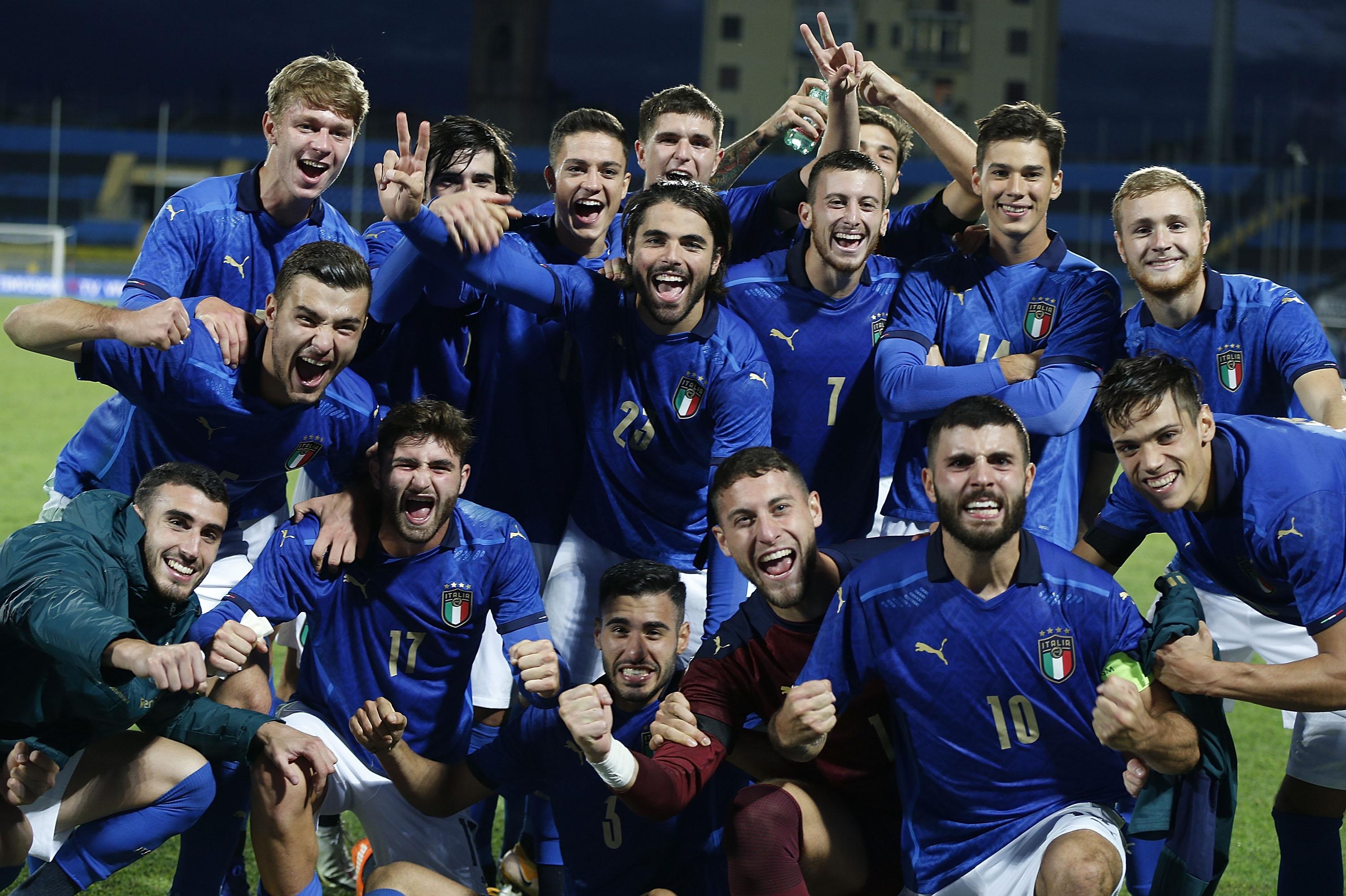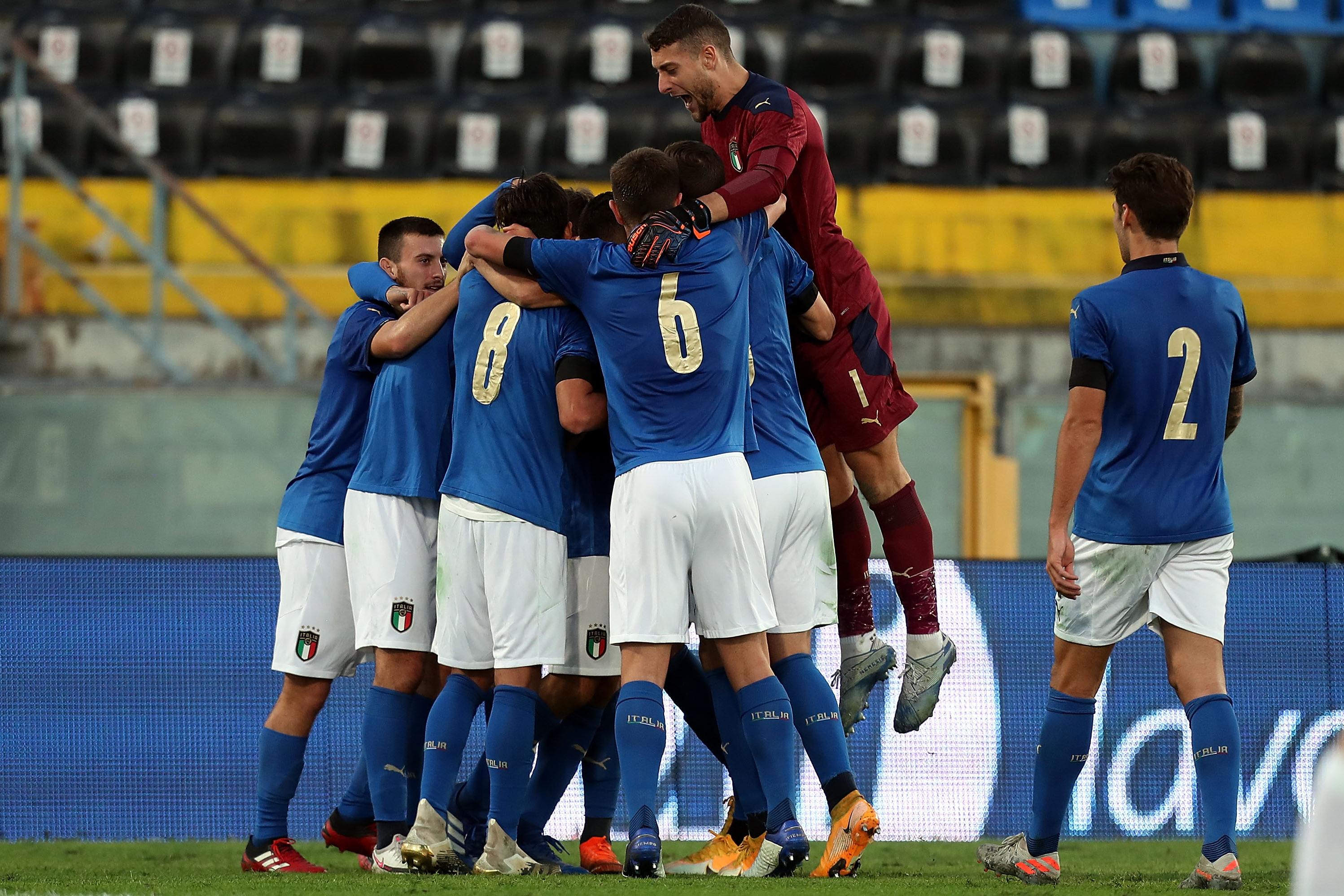PHOTO
PISA, ITALY - OCTOBER 13: Patrick Cutrone of Italy U21 celebrates after scoring a goal during the UEFA Euro Under 21 Qualifier match between Italy U21 and Ireland U21 at Arena Garibaldi on October 13, 2020 in Pisa, Italy. (Photo by Gabriele Maltinti/Getty Images) *** Local Caption *** Patrick Cutrone
Ahead of Italy’s Under-21 European qualifying matches against Iceland (12 November), Luxembourg (15 November) and Sweden (18 November) later on this month, the FIGC has decided to establish an Under-21 B side alongside the Under-21 National Team for these fixtures. The two teams, who will be coached by Alberto Bollini and Paolo Nicolato respectively, will work together synergistically, with Maurizio Viscidi, National Youth Team Coordinator, coordinating matters. The aim is to promptly respond to any needs that may arise.
The decision has been taken on the back of what happened in October, when the Under-20 National Team took to the pitch in place of the Under-21s (although a few players from the Under-21 National Team were involved) following a number of positive COVID-19 cases within the Under-21 camp. The Under-20s stepped up to the plate admirably, emerging 2-0 victors over Ireland. Given this encounter and taking into account the fact that the Under-21s have three matches coming up at a time when COVID-19 cases are increasing, it’s been decided that establishing two groups is the best solution. The two teams will both train at Tirrenia, but they’ll remain separate, including when it comes to accommodation arrangements. Should it be necessary, any Under 21 B players will be able to seamlessly transition to the Under-21 side over the course of the upcoming period. On Friday, the squads will be named, as will the players who will be involved for the senior side ahead of the Azzurri’s fixtures against Estonia, Poland and Bosnia Herzegovina.


"I would like to underline the function and importance of the ‘new’ Under-21 B team, which the Federation has established following the positive performance produced by the mixed Under-21/Under-20 team in October," said Maurizio Viscidi. "Given that three games are coming up and two of these will take place abroad at such a delicate and unpredictable time, we must be ready. It’s an initiative that also has Roberto Mancini’s support: it’ll allow the Head Coach to have an even bigger pool of players to choose from."
Paolo Nicolato had the following to say: "It’s a time when we need to find new solutions so that international football can continue to be played. I consider it an opportunity for the lads and for all of us, and I’d like to thank the clubs and players involved for their collaboration in these unique circumstances."
"At such an unusual time, the Federation wants to send out a message of continuity. This development will serve a double purpose: we’re proud to support the Under-21 National Team, who have a number of decisive European qualifying matches coming up. At the same time, we’ll continue to work to shape a group that will be involved in the Under-20 World Cup in Indonesia next May," said Alberto Bollini.
The Under-21s, who are currently top of their European Championship qualifying group with 16 points, will be involved in three decisive matches as they look to progress to the final tournament. The winners of the nine groups will qualify, as will the five best runners-up. Hungary and Slovenia, the co-hosts, will also be involved. The final tournament will then be played in two stages: the group stage and the knockout stage. The former, which will take place from 24 to 31 March 2021, will see the 16 qualified sides drawn into four groups of four, with the top two from each group progressing to the knockout stage, which will start from the quarter-finals (31 May to 6 June 2021).
For the Azzurrini, their match against Iceland will be particularly significant, especially as Luxembourg, which should be a slightly less tricky encounter, will be the team’s next opponents after their trip to Reykjavík. Should they win both matches, Italy would mathematically secure their place in the final tournament given their better head-to-head record against Ireland. It won’t be easy, though: Iceland have won four from four at home, narrowly beating Sweden and Ireland 1-0 and comfortably sweeping aside Luxembourg and Armenia (3-0, 6-1). The synthetic turf and difficult weather conditions (it’s currently particularly windy in the Icelandic capital) will only make things more complicated.
To determine the five best second-placed teams that will qualify for the final tournament, results against the teams in sixth place in six-team groups (as is the case for Italy) will not be included. For the Azzurrini, it’ll be vital to reach 17 points by picking up four points from their matches against Iceland and Sweden (discarding the six points that they are expected to obtain against Luxembourg) with the other groups in mind: only two runners-up should achieve more than 17 points: one of Switzerland and France in Group 2 and Portugal in Group 7.
Group 1
Standings
Italy (7) and Ireland (8) 16 points; Sweden (8) and Iceland (7) 15 points; Armenia (8) and Luxembourg (8) 3 points.
Schedule
12 November: Iceland vs. Italy (14:15)
13 November: Armenia vs. Sweden (16:00)
15 November: Ireland vs. Iceland (13.30), Luxembourg vs. Italy (17:30)
17 November: Luxembourg vs. Ireland (17:30)
18 November: Italy vs. Sweden (17:30), Armenia vs. Iceland (17:30)
